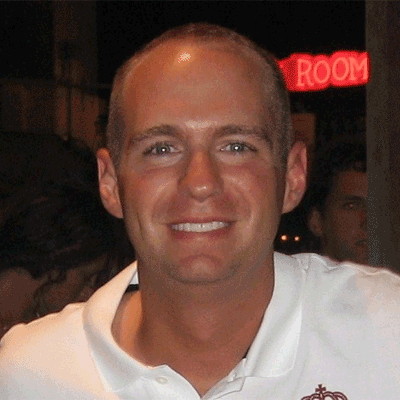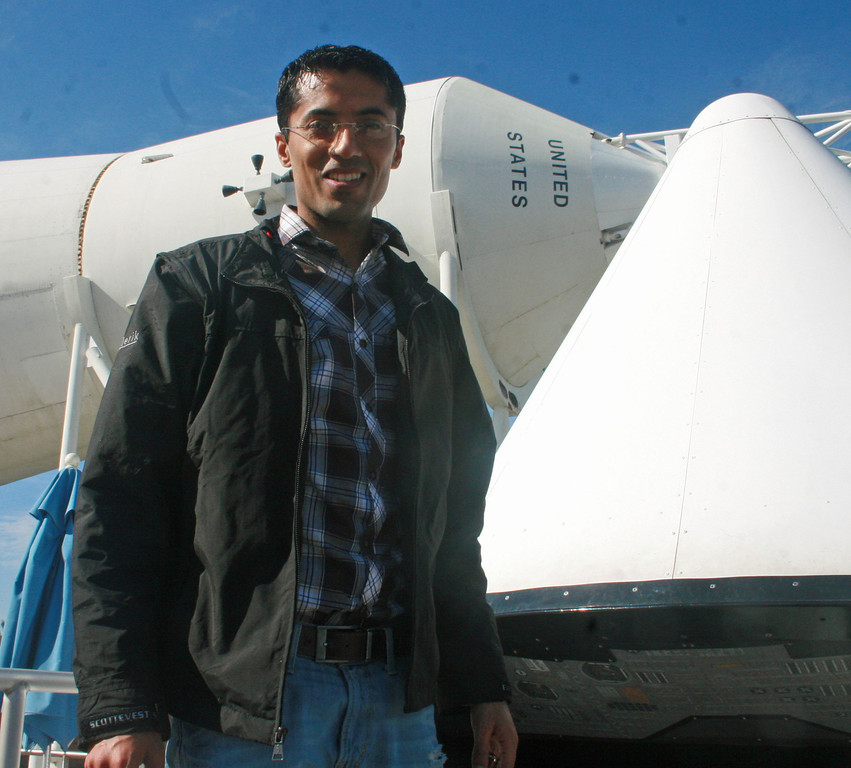Unlimited possibilities. Windows Azure is an open and flexible cloud platform built for you.
The Detroit Day of Azure is your chance to learn about Microsoft's cloud computing technology.
This event features presentations by over a dozen industry experts, Microsoft insiders, book authors, and MVPs. Sessions will cover the business value of Azure, details about implementing the technology, case studies, and architectural decisions in cloud computing. Beginners and experienced Azure developers will benefit from this event. You will have the chance to hear excellent content, ask questions of experienced professionals, and work with Azure technology directly.
If you are working in the cloud or considering moving applications to the cloud, you will want to attend the Detroit Day of Azure.
Breakfast and lunch will be provided.
Speakers

Dennis Burton
Web Developer for SRT Solutions
Dennis Burton is a web developer with SRT Solutions whose diverse portfolio includes online learning management systems, precision measurement using high speed data acquisition applications, as well as automotive diagnostic software. Since the beginning of his career, he has been working with systems that require processing large amounts of data quickly.
Dennis has been around long enough to be old to some and young to others, but firmly believes that what you do with your time is more important than how long you have been spending it. As an active member of the development community, Dennis serves on the board of the Ann Arbor .NET User Group, founded the a2node user group, and served as an organizer for the Lansing Day of .NET.
You can find him rambling on as @dburton on Twitter and on his blog at developusing.net.

Michael Collier
National Architect for Neudesic, Windows Azure MVP
Michael Collier is a Windows Azure MVP and serves as a National Architect for Neudesic, a Microsoft SI partner that specializes in Windows Azure. He has nearly 11 years of experience building Microsoft-based applications for a wide range of clients. Michael spends his days serving as a developer or architect – helping clients succeed with the Microsoft development platform. He gets very “geeked up” about any new technology, tool, or technique that makes his development life easier. He is also an avid golfer and attempts to be good at shooters on the Xbox 360. Michael also speaks nationally on Windows Azure - previous speaking engagements include multiple regional user groups, CodeMash 2011, Cloud Connections, Cloud Expo, and multiple Windows Azure Boot Camp events. You can follow Michael on Twitter at @michaelcollier and on his blog at michaelscollier.com.

Jason Follas
Technical Architect for Perficient
Jason Follas is a Technical Architect for Perficient, serving clients primarily located in the greater Detroit region (including Toledo, where he lives and serves as a leader of the Northwest Ohio .NET User Group). Since 1994, he has developed many interesting solutions on the Microsoft platform, including an aircraft loadplanning system used by an air freight company, ecommerce sites, geospatial web applications, and blend optimization software. Jason is also a Microsoft MVP Alumni.

John Ferringer
SharePoint IT Professional
John is a SharePoint IT Professional with over seven years of experience administering and supporting SharePoint technologies and has spent over thirteen years working in the information technology consulting industry. John has worked with Microsoft Online Services (MSO) and the Business Productivity Online Suite (BPOS) since its initial Beta release, and is a Delta Force Ranger for Office 365. He co-authored the "SharePoint 2010 Disaster Recovery Guide" in September, 2010 (tinyurl.com/SPDR2010book) and the “SharePoint 2007 Disaster Recovery Guide” in January, 2009 (tinyurl.com/SPDRbook). He is a Microsoft Certified Technology Specialist (MCTS) and a Microsoft Certified IT Professional (MCITP) for several Microsoft server products and platforms, including SharePoint 2007 and 2010, System Center Operations Manager 2007, and Hyper-V Server.

David Giard
Microsoft MVP
David Giard has been developing solutions using Microsoft technologies since 1993. He is a Microsoft MVP; an INETA mentor; and a past President of the Great Lakes Area .Net User Group. David has presented at many of the conferences and user groups around the Midwest. He is a recovering certification addict and holds an MCTS, MCSD, MCSE, and MCDBA, as well as a BS and an MBA.
is the host and producer of the mildly popular online TV show Technology and Friends. He is the co-author of the Wrox book Real World .NET, C#, and Silverlight. You can read his latest thoughts at davidgiard.com.
David lives in Michigan with his two teenage sons.

Joe Kunk
Developer for Dart Container Corporation, Microsoft MVP in Visual Basic
Joe is a Microsoft MVP in Visual Basic, author of the ON VB column in Visual Studio Magazine, three-time president of the Greater Lansing User Group for .NET, and developer for Dart Container Corporation of Mason, Michigan. Joe has been developing software for 30 years and has worked in the education, government, financial and manufacturing industries. Joe's co-authored the book "Professional DevExpress ASP.NET Controls" (Wrox Programmer to Programmer, 2009). Joe can be reached via email at joekunk@ajboggs.com.

Jennifer Marsman
Developer Evangelist in Microsoft’s Developer and Platform Evangelism Group
Jennifer Marsman is a Developer Evangelist in Microsoft’s Developer and Platform Evangelism group, where she educates developers on Microsoft’s new technologies. In this role, Jennifer displays her contagious enthusiasm for technology by speaking on a variety of Microsoft technologies. She is a frequent speaker at software development conferences across the United States.
In 2009, Jennifer was chosen as "Techie whose innovation will have the biggest impact" by X-OLOGY for her work with GiveCamps, a weekend-long event where developers code for charity. Prior to becoming a Developer Evangelist, Jennifer was a software developer in Microsoft’s Natural Interactive Services division. In this role, she earned two patents for her work in search and data mining algorithms. Jennifer has also held positions with Ford Motor Company, National Instruments, and Soar Technology.
Jennifer holds a Bachelor’s Degree in Computer Engineering and Master’s Degree in Computer Science and Engineering from the University of Michigan in Ann Arbor. Her graduate work specialized in artificial intelligence and computational theory. Jennifer blogs at blogs.msdn.com/jennifer and tweets at twitter.com/jennifermarsman.

Jeff Nuckolls
Windows Azure Platform Strategist
Jeff Nuckolls is the Windows Azure Platform Strategist, responsible for the Heartland District. Prior to joining the US Azure team, Jeff spent 8 years at Microsoft focused on driving our Enterprise Platform and Systems Integration, Data Management, and Developer-centric solutions.
With over 15 years of application development and architecture leadership experience on a variety of Microsoft and non-Microsoft platforms, Jeff focuses on enterprise solutions and business/technology strategy planning efforts. His area of expertise is on emerging markets (Cloud, Social, and Mobile Computing Platforms).
Prior to joining Microsoft, Jeff was distinguished as 1 of 110 worldwide that Microsoft endorsed as a Microsoft Developer Network Regional Director, as an independent consultant. Recognized for leadership in enterprise architecture, developer evangelism and consulting.

Brian Prince
Principal Cloud Evangelist for Microsoft
Brian H. Prince is a Principal Cloud Evangelist for Microsoft, based in the US.
He gets super excited whenever he talks about technology, especially cloud computing, patterns, and practices. His job is to help customers strategically leverage technology, and help them bring their architecture to a super level.
In a past life Brian was a part of super startups, super marketing firms, and super consulting firms. Much of his super architecture background includes building super scalable applications, application integration, and award winning web applications. All of them were super.
Further, he is a co-founder of the non-profit organization CodeMash (codemash.org). He speaks at various international technology conferences. He only wishes his job didn’t require him to say ‘super’ so much.
Brian is the co-author of “Azure in Action”, published by Manning Press.
Brian holds a Bachelor of Arts degree in Computer Science and Physics from Capital University, Columbus, Ohio. He is also a zealous gamer. For example, he is a huge fan of Fallout 3, Portal, and pretty much every other game he plays.

Mark Stanislav
Senior Consultant at NetWorks Group
Mark Stanislav is a Senior Consultant at NetWorks Group, focused on operational automation and information security. With a career spanning a decade, Mark has worked within small business, academia, start-up, and corporate environments primarily focused on Linux architecture, information security, and web application development. Through the recent years of his career, Mark has had an opportunity to architect and deploy cloud infrastructure within many different industries and for various business needs. Mark holds a Bachelor's degree in Networking & IT Administration and a Master's in Technology Studies focused on Information Assurance, both from Eastern Michigan University. Mark also holds his CISSP, Security+, Linux+, and CCSK certifications.

Brent Stineman
Cloud Solution Specialist for Sogeti, Windows Azure MVP
Brent has a passion, a passion for "the cloud". Nothing has captured the imaginations of IT as much as the potential of this brave new frontier. For the last three years, this passion has been focused on the Windows Azure platform, sharing his excitement, experience, and first-hand knowledge with anyone that wants to listen. Brent is the national Cloud Solution Specialist for Sogeti USA and was recognized in 2010 as an inaugural Microsoft MVP (Most Valuable Professional) for the Windows Azure Platform.

Mike Wood
Senior Application Developer for Resurgent Capital Services
Michael Wood is a Senior Application Developer for Resurgent Capital Services. He describes himself as a problem solving, outdoorsy, user group leading, dog-loving, blog writing, solution creating, event planning, married, technology speaking, father of one kind of guy. When he's not living up to that title he's an avid reader, (horrible) violinist and gamer. Michael is one of the Founding Directors of the Cincinnati .NET User Group as well as the founder of the Cincinnati Software Architecture Special Interest Group. He is also a founding member of the software architecture web resource nPlus1 (nplus1.org), instigator of the informal code pairing Bitslinger events in Cincinnati and a Microsoft MVP in Windows Azure. You can catch up with Mike on his blog at mvwood.com/blog and on twitter under the handle @mikewo.

Chander Dhall
Independent Consultant, an INETA speaker and Technology Advisor for Ria Consulting, LLC
Chander Dhall is a Microsoft MVP, author, trainer, mentor, professional software architect/lead developer, INETA speaker, open source contributor, community leader and organizer with years of experience in enterprise Software Development. He works in a goal oriented, technologically driven, fast paced AGILE (SCRUM) environment. He is the founder of Dallas day of dot net. He has a Master’s Degree in computer science with specialization in algorithms, principles and patterns and is focused on building high performing modular software. Chander leads a .NET user group in Dallas and is the founder of Dallas day of dot net International Conference. Chander recently got recognized as "One of the top organizers by Eventbrite. Chander has been a featured speaker in numerous conferences and code camps all over the world. You may follow him on twitter @csdhall.

Eric Boyd
Founder + CEO, responsiveX
Eric D. Boyd is the Founder and CEO of responsiveX. Eric began his technology career by starting a web development firm in the 90’s and has served in multiple roles since including developer, consultant, business owner and technology executive. Today, he helps companies create great web, mobile and client experiences, and these apps are often powered by cloud services. You can find him blogging at ericdboyd.com and on Twitter at @ericdboyd.
Sessions

When? Where? Why? Cloud?
Brent Stineman
Everyone is talking cloud. Every vendor has a product. If you are confused, you are not alone. Together we’ll dispel the haze surrounding this buzzword and get a clear pict ure of what’s before us. More importantly, we discuss why you should care and what opportunities the cloud makes available to you and what you could be leaving behind if you don’t free your mind, and embrace the possibilities.

Getting A Handle On Azure: Diagnostic & Management
Mike Wood
Developing for the cloud does take a slightly different mindset. While most of your current skills with .NET will simply transfer to the cloud, there are some considerations when working with Microsoft Windows Azure. In this presentation we will talk about the basics of how to manage your Azure applications in the cloud beyond using the Portal website and how to determine what’s going on when things go wrong. We’ll cover using PowerShell and other command line tools, how the diagnostics manager works and how to get your performance/logging data out of the cloud.

A Queue By Any Other Name Would Still Work The Same ... Or Would It?
Mike Wood
When Windows Azure was originally released a built in queuing feature was included. The Windows Azure Storage Queues were the suggested way for compute instances and applications to talk to each other. Flash forward to just a few months ago and another queue feature appears on the Windows Azure scene with Service Bus Queues and Topics. So, why are there two queue technologies? How do they differ? When should you choose one over the other? These are the questions we'll look to answer in this session.

The Hybrid Windows Azure Application
Michael Collier
The Windows Azure platform is a fairly feature rich environment. You can run your web applications there. You can run your data processing applications (services) there. But you don’t have to run your entire application there. You can run part of your application in “the cloud”, and part of your application on premise – giving you the best of both worlds. But why would you not put everything in the cloud? Perhaps you don’t need the massive computing power Windows Azure provides, but you would like a cheap an easily accessible data store. Maybe your application just isn’t ready, yet, to be run in the cloud. Whatever the reason, in this session you will learn the basics for creating a hybrid application which leverages various features of Windows Azure. You will see how to leverage Windows Azure’s rich features and APIs to extend your application to new heights.

Windows Phone 7 And Windows Azure – A Match Made In The Cloud
Michael Collier
Mobile platforms such as Windows Phone 7 are the rising stars of consumer and enterprise computing. In order to be successful, mobile applications need to be highly scalable and able to consume data from any location at any time. The Windows Azure Platform is well-suited to provide the scalable compute and storage services for mobile applications and devices. The Windows Azure Platform provides a friendly REST-based API and comfortable development environment, as well as a scalable infrastructure well-suited for mobile applications and devices. In this session, we will explore how easy it is to leverage Windows Azure’s compute, storage, and Content Delivery Network services for your next great Windows Phone 7 application. Coming away from this session you will have a solid understanding of how Windows Phone 7 and Windows Azure are a great couple – a match made in the cloud!

Architectural Patterns For The Cloud
Brian Prince
Enough mushy, baby talk about the cloud. Let’s roll up our sleeves and talk about some real patterns for how to use the cloud in the real world. Hint: As much as some vendors want you to think so, it doesn’t require you to move everything to the cloud. Leave with some concrete ways to use the cloud in your existing world.

The Cloud and Security: Do They Mix?
Brian Prince
The cloud is a great new force in computing. A lot of companies are betting their future on it, and many more are dipping their toes in the water. There are a lot of concerns about the cloud, and if it is secure. In this session Brian will discuss what security in the cloud means, and how you can be both secure and in the cloud. He might bust some myths and burst some bubbles in the process.

Azure 101
Jennifer Marsman
Did you realize that you don’t need to code on the .NET platform to use Windows Azure? After this session, you will walk away understanding the basics of Microsoft’s cloud computing solution. We will discuss what cloud computing is, Azure datacenters, web and worker roles, a brief look at storage, Azure’s upgrading story, and Azure’s multiple platform support for Java, Ruby, PHP, and more.

Building Your First Azure App
Jennifer Marsman
Let’s get our hands dirty! In this session, we’ll explore some Azure demos and write some code. We’ll also cover how to work with the storage library, Visual Studio templates, the various ways to push code to the cloud, and how Java/PHP/Ruby developers can use Azure.

Your Database In The Cloud: SQL Azure
Jason Follas
To round out its Windows Azure platform, Microsoft offers SQL Azure as a relational database service that runs in the cloud. SQL Azure is very easy to provision (No DBA Required!), and empowers developers to focus on their applications instead of building, administering, and maintaining databases. In this lap around SQL Azure, Jason Follas will explain what’s included, how it differs from the traditional SQL Server, ways to migrate existing databases to SQL Azure, and ways to integrate SQL Azure into traditional environments.

Using Geospatial Data With SQL Azure
Jason Follas
Due to the pervasiveness of GPS data, developers today are being asked to incorporate geospatial information into their data-driven applications. Working with spatial data, though, involves using complex geometric formulas that are difficult to implement in SQL queries. What developers need is a common abstraction layer running on the database itself that softens the complexity of working with geospatial data, yet is straightforward enough to incorporate directly into queries to provide spatial-based filtering and distance calculations. Microsoft introduced two new spatial data types (Geometry and Geography) in SQL Server 2008 that provide an implementation of Open Geospatial Consortium (OGC) standards. These spatial types are being enhanced to include more functionality in SQL Server 2012, but many of the new features are already operational on SQL Azure Q4 2011 Service Release, and can be used today by your on-premise or cloud-based applications.

Single Page, Real Time Web Apps Using Node.js And Windows Azure
Dennis Burton
In this session, we will explore creating a fully functional web site without the use of a traditional server-side web stack and without a relational database backend. Based on this exploration, you can see which of these tools can help you build applications more effectively. Bring your buzzword bingo cards because in this session we will cover the cloud using Windows Azure, node.js, backbone.js, and coffeescript.

Azure Team Insights/Perspective (Microsoft Investments Today & Tomorrow)
Jeff Nuckolls
Meet the Azure team at Microsoft for some insights and perspectives on current and future Microsoft investments into the cloud.

Free Databases In The Window Azure Marketplace
Joe Kunk
Windows Azure Marketplace is a collection of software applications and databases available globally as hosted by Windows Azure. In this session we look at the databases currently available, how to easily consume the data, and how to publish your own data for monthly subscription income if you wish.

Getting To Know Office 365
John Ferringer
This session is designed to provide attendees with a straightforward introduction to Office 365 and its services, plans, and functionality. It will cover the various platforms Microsoft has built into the Office 365 offering (cloud versions of Exchange, SharePoint, and Lync as well as special licensing for the Office suite), review its strengths and weaknesses, and discuss some potential use cases for this compelling cloud-based business solution.

Cloud Disaster Recovery: Leveraging Cloud Computing For Cheap Hot Sites
Mark Stanislav
In this presentation, I talk about using Amazon Web Services to do efficient and cheap hot sites, focused mostly on SMB; talk about a real DR plan for a company I did, we go over the math, etc.

Persistence In The Cloud: How To Use Azure Storage
David Giard
Azure Storage allows you to store data in the cloud in a way that is durable, scalable, and highly-available. Azure Storage provides queues, blobs, and tables in which to store data. In this session, you will learn about each of these storage mechanisms and how to access them from your .NET and Windows Azure applications.

Scaling Applications In Azure Using Azure Table Storage
Chander Dhall
In this talk you will learn the intricacies of Azure Table Storage. Through this session you will discover the best partitioning strategies to scale your websites in the cloud. You will learn advanced techniques to create high performing web applications.

BI In The Cloud With SQL Azure Reporting
Eric Boyd
Why maintain infrastructure for operational reporting, when you can do it in the cloud with SQL Azure Reporting? SQL Azure Reporting provides a set of capabilities that are familiar for developers using SQL Server Reporting Services on-premise. We will begin this session by considering the benefits and scenarios for BI in the cloud. Next, we will walkthrough what you need to get started using SQL Azure Reporting. We will then develop and deploy some reports to SQL Azure Reporting. Unfortunately, SSRS and SQL Azure Reporting do not have complete feature parity. As a result, we will conclude by reviewing the challenges and limitations of using SQL Azure Reporting over SQL Server Reporting Services.
You will learn the benefits of BI in the Cloud; the capabilities of SQL Azure Reporting; how to create and deploy reports to SQL Azure Reporting; and an understanding of the limitations of SQL Azure Reporting.
Azure Codeslingers
We will designate one room for programmers to build Azure applications. Attendees can bring a laptop and either work on their own project or work through the Azure labs, which we will provide for you. Many smart people will be around if you get stuck. Remember to download and install the Azure SDK and sign up for a free Azure Trial before you arrive!
Schedule
| Time | MPR 1&2 | MPR3 | Technical Briefing Center |
|---|---|---|---|
| 8:00 | Welcome / Announcements | ||
| 8:15 | Keynote: When? Where? Why? Cloud? (Stineman) | ||
| 9:00 | Break | ||
| 9:10 | Azure 101 (Marsman) | Persistence In The Cloud: How to use Azure Storage (Giard) | Cloud Disaster Recovery: Leveraging Cloud Computing for Cheap Hot Sites (Stanislav) |
| 10:10 | Break | ||
| 10:20 | Building your first Azure app (Marsman) | Getting To Know Office 365 (Ferringer) | BI in the Cloud with SQL Azure Reporting (Boyd) |
| 11:20 | Break | ||
| 11:30 | Windows Phone 7 and Windows Azure – A Match Made in the Cloud (Collier) | Free Databases in the Window Azure Marketplace (Kunk) | Azure Team Insights/Perspective - Microsoft Investments Today & Tomorrow (Nuckolls) |
| 12:30 | Lunch and Panel Discussion: Ask The Experts | ||
| 13:40 | Your Database in the Cloud: SQL Azure (Follas) | The Hybrid Windows Azure Application (Collier) | A Queue By Any Other Name Would Still Work... Or Woud It? (Wood) |
| 14:40 | Break | ||
| 14:50 | Architectural patterns for the cloud (Prince) | Using Geospatial Data with SQL Azure (Follas) | Scaling Applications in Azure Using Azure Table Storage (Dhall) |
| 15:50 | Break | ||
| 16:10 | Single page, real time web apps using node.js and Windows Azure (Burton) | The Cloud and Security: Do they mix? (Prince) | Getting a Handle on Azure: Diagnostic & Management (Wood) |
| 17:10 | Break | ||
| 17:20 | Closing | ||
Location
Microsoft Offices
1000 Towne Center Dr, Suite 1930
Southfield, MI 48033
Sponsors
The Day of Azure would not have been possible without the support of our generous sponsors. Please take a few minutes and visit them at the conference or their websites.
Hotels
| Name | Discount |
|---|---|
| Holiday Inn Express Hotel & Suites Southfield 25100 Northwestern Hwy Southfield, MI 48075 (248) 350-2400 | None |
| Hawthorn Suites by Wyndham Detroit Southfield 26700 Central Park Boulevard Southfield, MI 48076 (248) 352-8900 | None |
| Comfort Suites24977 NW Hwy. Southfield, MI 48076 (248) 357-9990 | None |
| Detroit Marriott Southfield27033 Northwestern Hwy Southfield, MI 48033 (248) 356-7400 | None |
| Embassy Suites Detroit - Southfield28100 Franklin Road Southfield, MI 48034 (248) 350-2000 | 10% Discount |
| Hampton Inn - Southfield27500 Northwestern Highway Southfield, MI 48034 (248) 356-5500 | None |
| Candlewood Suites Extended Stay Hotel Detroit Southfield 1 Corporate Dr Southfield, MI 48076 (248) 945-0010 |
$62.99/night for studio suite $82.99/night for one-bedroom suite |
| Hilton Garden Inn Detroit- Southfield26000 American Drive Southfield, MI 48034 (248) 357-1100 | $92/night |
Note: When reserving a room at a hotel that offers a disount, please be sure to mention the name of the event.
Downloads
- Slides: When? Where? Why? Cloud? (B Stineman)
- Slides: Architectural Paterns for the Cloud (B Prince)
- Slides: The Cloud and Security. Do They Mix? (B Prince)
- Slides: Getting to Know Office 365 (J Ferringer)
- Slides and Demos: Free Databases In The Window Azure Marketplace (J Kunk)
- Slides and Demos: A Queue By Another Name (M Wood)










